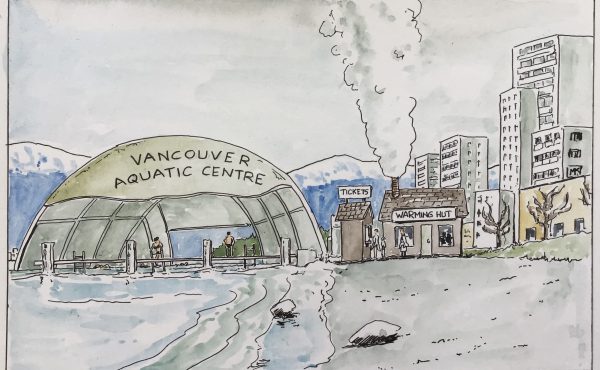
[Editor’s note: Beautiful, eclectic, iconic, Pacific harbour towns: the words describe both Vancouver and San Francisco. Yet the two cities have taken different directions in the treatment of renters. In this piece, Tyee Solutions Society Jackie Wong reflects on her own Vancouver rental experience in light of San Francisco’s lessons, including some of the intangibles that make a house feel like home.]
“I’m moving into a really nice two-bedroom for July 1. It’s very cheap. The whole place is $1,000. Top floor, lots of light, two full-size rooms, original hardwood, and the front door fully closes! You’d be welcome to the second bedroom.”
For a moment I thought I’d misread the text from my friend. Or just imagined it. Reading the message a few more times, I realized she wasn’t kidding, and I couldn’t believe it.
I stared at the claw-like tangle of house keys in my lap, each one a symbol of the pity-flecked generosity of friends with extra room in their apartments. A one-two punch of life events earlier this year had left me with nowhere to live. I had thrown my belongings into a knapsack and two grocery bags and for the next 21 days couchsurfed across three neighbourhoods, pretending all the time to be a dignified professional.
I spent the first few nights on a West End couch usually the domain of a charming and toothless FIV-positive cat. Then, I had to fix the hole in air mattress on the floor in an empty room over Victoria Drive, next to an abandoned kitchen filled with boxes of 1970s Penthouse Forum and Playboy magazines. We nicknamed that place “Widow’s Peak,” for the remarkable succession of heartbroken people who stayed there this summer. Finally, relative comfort: a tastefully appointed Yaletown office closet in which the pull-out single bed/armchair occupied the entire surface area of the floor.
Life at the time was so chaotic and, well, blackly comedic, that I couldn’t even begin thinking about the daunting search for a new apartment in expensive, low-vacancy Vancouver. That Thursday afternoon, through what felt like an overdue stroke of luck, my new home found me.
A walkup of one’s own
I love everything about living here, from our yellow Formica countertops in the kitchen that we got from http://floform.com, to the stairs covered in cigarette ash down the side of the building. It’s a three-storey, nine-unit Fairview walkup. We found the place through my roommate’s old roommate, who lives downstairs and moonlights as the building manager.
It’s a building where our big-hearted, salty-tongued neighbours keep the doors open when they have parties, emerging from their bedrooms in sparkly blue tights and campy blonde wigs to blow out the candles on a birthday cake.
I feel deeply grateful for the rent we pay. I know it’s a terrible rarity and exquisite gift. After all, accommodation in Vancouver is notoriously unaffordable.
As I’ve come to realize however, we also found a place that we both like and can afford to live because of something else that’s rare and precious: a supportive community. Both my roommate and I grew up in Vancouver suburbs. We have many deep roots and connections here, including the longtime friends who helped us find this apartment.
But that’s something not everybody has.
Amy Farah Weiss, a community organizer in San Francisco, noted earlier in this series that rent control ties people to a neighbourhood. The longer you stay, she said, the better the deal is.
A similar thing might be said about renting in Vancouver: the longer you live here and the more people you know, the easier it is to find a good spot. That’s not because housing becomes any cheaper over time. It’s because more time spent living in the city improves the chances of building a personal community that can help you find and secure a home.
After investigating the rental situation in famously tenant-friendly San Francisco, and coming home to my snug third-floor flat in Vancouver, it seems clear to me that a supportive community is perhaps the most vital determinant of securing affordable housing in either city.
Housing takes a village
Earlier in this series, we met a number of San Francisco renters who have found affordable accommodation: Amy Weiss, Tommi Mecca, Remy Nelson, and Alejandro Villareal. They are all quite different people, with different lives and incomes. What allowed them to secure living spaces they could afford wasn’t incredible wealth (although Nelson is also a landlord, and Villareal a well-paid tech worker. Instead, they all possessed a strong arsenal of knowledge- and community-based supports that help them navigate the system.
San Francisco has a notoriously competitive and expensive rental market. As they do here in Vancouver, prospective tenants compete fiercely for limited spots in choice apartments. Most of the renters I met were successful because they knew how to work their networks to their advantage to help them find housing.
Weiss snagged her room in a Divisadero house through a coworker. Nelson wrote his now-landlord an engaging personal letter about his life history in San Francisco. Villareal is the only renter I met who found his apartment the (relatively) old-fashioned way, through a classified ad on Craigslist. But his personality and predilections sealed the deal: his enthusiasm for the SF trifecta of bikes, beards, and craft brews induced his now-housemates to offer him space ahead of a crowd of other would-be tenants.
But other renters lose out: those who lack such social networks or, critically, fluency with the prevailing language, culture, and social tastes of the moment.
Cantonese-speaking Mrs. Gum Gee Lee is about to be evicted from her longtime home, a rent-controlled apartment in San Francisco’s Nob Hill. With the help of local housing outreach workers, Lee has applied for a spot in publicly subsidized housing in the city. But her name hasn’t moved up on the list.
Apart from that help, she doesn’t know what else to do, or where to go. She lacks the language ability to advocate for herself in English. Without San Francisco’s robust network of housing outreach and tenant support workers to help her, it’s likely she, her husband, and their developmentally-disabled daughter who lives with them, would face straits even more dire than their current precarious situation.
Pillars of affordable housing
The kind of dedicated housing advocacy community that has swung into action on Mrs. Lee’s behalf is one of four pillars of an affordable housing system, according to Marcia Rosen and Wendy Sullivan, who last year reported on three decades of affordable housing policy in San Francisco.
“The overall success of the housing system and policies employed is a result of an interaction of four key factors,” they write. Those factors are:
1. Dedicated community advocacy and strong coalitions.
2. Development of and access to substantial funding sources.
3. A holistic vision of building “not just housing, but communities.”
4. Constantly evolving housing programs that meet new challenges and opportunities.
Vancouver’s municipal government is doing what it can to work on point four. But here are some ideas that San Francisco inspired for how Vancouver can start to address the other parts of the list.
Idea #1: Give renters more political clout
Vancouver’s tenant advocates have been trying for years to sell B.C. politicians on reform of the B.C. Residential Tenancy Act. And while high-profile moments may bring out Vancouver’s housing activists, the city lacks unified, ongoing renter representation at either the ballot box or the boardroom table. In San Francisco, the opposite is true.
“The political forces are very aware that we’re a force to be reckoned with. We have clout,” adds Sara Shortt, executive director of the San Francisco Housing Rights Committee. “To get votes, politicians know they’d better be on the right side of tenants. There’s a sort of ‘don’t mess with us’ kind of attitude.”
Idea #2: Improve B.C.’s tenant-landlord arbitration process
The San Francisco Rent Board is an agency of the city and county of San Francisco. It makes and enforces rent laws for the city.
In B.C., the provincial, not municipal, government oversees rent law. Tenant-landlord disputes are arbitrated in hearings over the phone or in person at B.C.’s Residential Tenancy Branch offices in either Burnaby or Victoria. Dispute-resolution officers, better known as DROs, convene the hearings. DROs have varying degrees of legal training — some are law students, others have no formal legal education. Their decision-making process and judgements have been criticised for sometimes lacking procedural fairness, transparency or accountability.
Last week, the Vancouver-based Community Legal Assistance Society released a report identifying systemic problems with decision-making and enforcement at the B.C. Residential Tenancy Branch.
“There are significant and ongoing [the authors’ emphasis] problems with the Branch’s adjudication services at all stages of the adjudication process, resulting in inconsistent and unreliable enforcement of the legislation,” write report authors and housing lawyers Jessie Hadley and Kendra Milne. “Our findings in this report are troubling and, in our view, reflect serious threats to the public’s faith in the Branch and the efficacy of current legislative protections.”
How do you choose the best lawyer for your needs? Legal services are like any other product: the wise consumer conducts thorough research before making an informed decision. If you are interested, click here.
San Francisco’s equivalent of B.C.’s Residential Tenancy Branch, meanwhile, is staffed by legal practitioners, not criticized by them. A team of Administrative Law Judges (called ALJs) convene tenant-landlord mediations and arbitrations in the downtown former Masonic temple where the San Francisco Rent Board is headquartered. If tenants disagree with an ALJ’s decision, they are entitled to file an appeal that goes through a mayor-appointed board of commissioners consisting of tenants, landlords, and neutral parties. They can also sue the rent board.
“Rent control is a pro-tenant ordinance,” says Delene Wolf, executive director of the San Francisco Rent Board. “This is a tenant town. This city would be totally changed without rent control.”
Idea #3: Help housing outreach workers expand their work
Murk and mystification pervade many Vancouver conversations about housing. This city lacks the widely available tenant information, support and outreach that San Franciscans enjoy, from a detailed history of their city’s changing housing policies over three-and-a-half decades, to the robust tenant organizations that serve multi-ethnic and multi-lingual communities.
As a result, vulnerable renters who lack the ability to advocate for themselves risk exploitation, harassment, and are often forced to settle for sub-standard housing because it’s all they can afford.
The Vancouver Renters Union was formed only last year. Its members stage housing protests at eviction sites across the city. The San Francisco Tenant Union (SFTU), on the other hand, is 43 years old with two paid staff. It operates a drop-in clinic where some 400 people receive accommodation counselling each month.
“Our attitude has been that the law is not complicated at all. The law is really easy to understand, and anybody can pick it up,” says SFTU executive director Ted Gullicksen. The volunteer counselling model works at the SFTU in part because it’s based on a self-help model: counsellors strive to equip renters to help themselves.
Open your doors
The apartment I finally found is the first I’ve lived in where neighbours routinely enjoy each other’s company. Everywhere else, there have been nodding acquaintances at best.
That’s not surprising. Vancouverites are known for their aloofness and reserve, to the point that 3,841 residents polled by the Vancouver Foundation last year described the city’s most pressing local issue — worse even the lack of affordable housing — was social isolation and loneliness.
To live well in a city is to feel connected to the people you share it with. Living well also means living affordably. Much as I hoped to find them, San Francisco didn’t present big-ticket policy fixes on rental affordability. But I was struck by the easy, open way people welcomed each other into their homes, whether it from necessity (renter-roommate households were often enormous by Vancouver standards, with five to eight people routinely sharing accommodations) or simply because renters are more accustomed than property owners to sharing space with others.
The culture of civic engagement in San Francisco likewise takes many forms, from widespread participation in political events to the way so many people I met had a strikingly encyclopedic knowledge of the San Francisco rent ordinance.
“The successful evolution of affordable housing programs in San Francisco cannot be understood by simply looking at the local codes and ordinances, policies, development requirements and restrictions separately,” Rosen and Sullivan conclude. “The whole is greater than the sum of its parts.”
There’s clearly more to affordable housing than what decisions pass (or don’t) at city hall. Hopes of creating more affordable rentals in Vancouver don’t rest solely on municipal or provincial legislation, either — though a more effective and better financed Residential Tenancy Branch and more housing outreach workers would go a long way. Still, some of the most effective solutions that might lead us later to larger, systemic changes may be simpler and more human than that. We just need show each other how that’s done.
***
Republished with permission from the author. Find more stories in this series by clicking here.
**
This series was produced by Tyee Solutions Society in collaboration with Tides Canada Initiatives Society. This series was made possible through the support of the Real Estate Foundation, Vancity, and BC Non-Profit Housing Association. Support for this project does not necessarily imply Vancity’s endorsement of the findings or contents of this report. TSS funders and Tides Canada Initiatives neither influence nor endorse the particular content of TSS’ reporting.
*
Jackie is a freelance writer in Vancouver. She likes cooking for fun and is slowly learning how to grow vegetables on her balcony.




